The year is 1903, over the Winter Palace, instead of the royal standard, a tricolor flutters, as if power had already passed to the Provisional Government. The walls of the building are completely green, as they were made only in 1947. Before us is the game "Counterintelligence", published with state money and designed, like other games – participants in the grant competition of the Internet Development Institute (IRI) to teach young people about history and develop patriotic feelings in them.
If with enlightenment the authors got into a puddle from the first frame, then patriotism is more than enough. After all, the game is about brave pre-revolutionary counterintelligence officers opposing Japanese, German, British and, for some reason, American spies. The developer is the Replication Technologies company. She was not previously seen in the production of games, but she made the GAS "Vybory" and other projects for the Central Election Commission and United Russia.
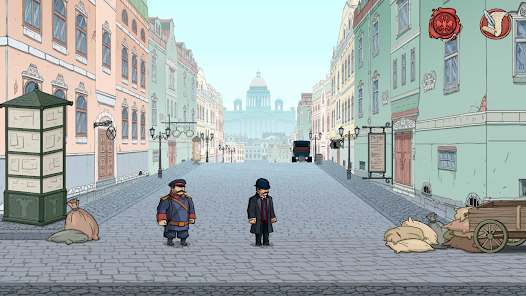
Unfortunately, we did not manage to complete the game and immerse ourselves in the plot. The monstrous interface that just stops working at times makes this nearly impossible. Is it any wonder that in the two months since the release of the game only a thousand people have downloaded the game and no one bothered to write at least a simple review.
"Counterintelligence" is distributed free of charge , because it was made with the financial support of the state. How much money was spent is not disclosed. But in March 2022, the project became one of the winners of the IV session of the IRI Competition for the creation of Internet content for young people.
The IRI is an NPO founded back in 2015 at the initiative of the presidential administration. Among the co-founders are the Russian Federation and the Ministry of Science and Education. Previously, IRI specialized in movies, blogs and podcasts, but since 2022 it has also been involved in games. At last year's St. Petersburg International Economic Forum, the organization's CEO Alexei Goreslavsky said that he would allocate at least 1 billion rubles for game development in 2022.
Between Tetris and Special Forces
Despite the rich history of the Russian gaming industry and the large role of state orders in the economy, these two entities have almost never intersected before. And the projects made with state participation could be counted on the fingers.
In 2006, two games were funded by the now abolished Federal Drug Control Service of the Russian Federation (FSKN). These were the shooter "Special Forces Fighter of the Federal Drug Control Service" and the quest "Anti-Drug Addiction". The games were distributed free of charge to schools and libraries, but were not successful. Former President of the Russian Computer Sports Federation Alexander Gorbachenko met them in 2007:
“We then traveled around the country with an anti-drug action, organized cyber tournaments in cities. And colleagues from the Federal Drug Control Service asked us to watch their Special Forces Fighter. He looked, to put it mildly, creepy. I remember I was even offended. After all, it’s a good thing to convey ideas to your audience through computer games, but the implementation was no good. I think the point is that the system for allocating and reporting public funds was simply not ready for this. Here you receive money in March, and in the autumn you should write a report for their use. You have six months and a small sum. Most likely, you will only have time to reshape one of the existing games.
It seems that this is exactly what happened with Anti-Drug Addiction, released by Pipe Studio, which made the Pilot Brothers quest in the same years. According to rumors, the whole process of work took 2-3 months, in one of the Pilot Brothers series they simply changed the pictures. It was not possible to verify the reliability of this information, but Alexander Gorbachenko believes that, most likely, it was so.
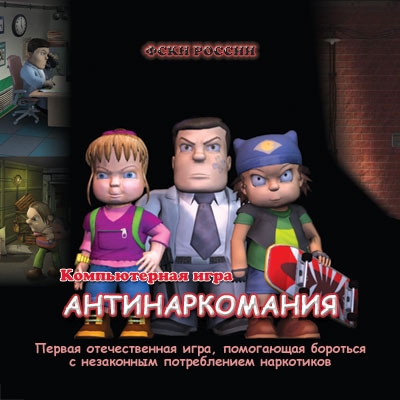
Another project of those years was dedicated to the commando, no longer of the FSKN, but of SOBR. “That's the whole gameplay here, nothing more – run and shoot. Four types of weapons, an engine from the Vivisector, a stupid plot about a conspiracy against the Motherland, ”Igromania magazine wrote about this game.
In 2011, Dmitry Medvedev spoke about the need to develop the gaming industry. The then president suggested creating "an online multiplayer game like World of Warcraft based on Russian history." But during his reign, only the "Games" section appeared on the portal of the Ministry of Defense. There were “Tetris”, “sapper”, “sea battle” turned into a military style and a test for knowledge of military ranks.
According to Mikhail (his name has been changed at his request), a producer of a large game studio with Russian roots, until 2017-2018, the state was basically not interested in the gaming industry:
“For me, a rather high-quality report of Roskomnadzor on this market that was published in those years became a landmark moment. That was the first time that the state considered computer games not as an evil to be fought, but somehow differently. And in 2021, quite a state businessman, Vasily Ovchinnikov, created the “Organization for the Development of the Video Game Industry.”
Ovchinnikov is not from game design at all. In the 2000s, he led the Student Community organization, which, together with RIA Novosti, promoted St. George ribbons to the masses. Then he was the general director of the state company Mosgortur and wrote the book Manifesto of the Right Official. And in the early 2020s, Ovchinnikov, as he himself explains to The Insider, realized that it was time to act:
“The idea was to create an association of large market developers, such as Sbergames and VK, who would jointly solve all issues of industry development, taking into account the state financial and administrative leverage. If before that, big officials were afraid to get involved with the games and blamed them for any shooting at school, now they were ready to turn their faces to the industry. The mood was positive, everyone made plans. Nobody thought that February 2022 would come and everything would change.”
Before the war itself, another bureaucratic project appeared – to impose a special tax on the largest playgrounds, such as Steam, PlayStation Store, Epic Games Store, and send the money to the development of patriotic games. They planned to collect 5% of the Russian turnover of sites, officials from the Ministry of Digital Development believed that it would be about 10 billion rubles a year. Vasily Ovchinnikov assures that from the very beginning he did not support this idea:
“We objected that ultimately all the costs will fall on the shoulders of users. The proposal went to the government and never returned. I understand that the government did not like it. And now all this does not make sense at all, because there is no one to tax.”
Games and war
The war, according to Ovchinnikov, affected the developers in different ways:
“Studio revenue from games at Apple has dropped dramatically. On the Android platform, everyone who wanted to built in payment systems that allowed them to transfer money to Russia. On Steam, Russian companies post their products as before, money is collected and sent to Russia through third countries and non-sanctioned banks. Large developers easily rebuilt, it became more difficult for small ones.”
At the beginning of the war, Wargaming (their most famous game is World of Tanks) announced the dismissal of one of its top managers for supporting Russian aggression, as well as the closure of its Russian division, the St. Petersburg studio Lesta Games. But in fact, the studio continues to work and manages the famous tank simulator throughout Russia and Belarus. According to Vasily Ovchinnikov, "Russian developers did not suffer, users suffered – before they played with the whole world, but now only with each other."
Ukrainian developers have already made dozens of games about the current war. Among them are simple mobile applications where you have to tow wrecked Russian tanks or hit Putin on the head. There is also a very sad graphic novel Ukraine war stories about the survival of civilians in the occupied Gostomel, Bucha and Mariupol. In the work – a big game about the life of volunteers and a shooter where you have to fight with Russian soldiers. On the Russian side, only a few mods for strategies and shooters appeared (mods are original games redone by amateurs with new maps, characters, tasks, objects, weapons). For example, in one of these unofficial additions to the Ukrainian STALKER, it is proposed to play as an FSB major and fight in the Chernobyl zone with the Ukrainian military and the Azov regiment.
Ovchinnikov follows the success of the Ukrainian gaming industry with bitterness:
“Every time something on this topic comes out on Steam from Ukraine or those who support it, it is hotly discussed in the developers' chats. People worry that there is no alternative history. It really doesn’t exist, although many developers are patriotic.”
Mikhail has a different opinion about the community of Russian game designers:
“Game dev community is generally quite liberal. And to take orders for the authorities – zashkvar. The Ukrainians had a clear motivation to make such games. The Russians do not. On the other hand, recently 1C studio loudly announced the transfer of all assets to Russia. So, if the state invests in patriotic projects about the current war, I am ready to argue that it will not do without 1C.”
It is worth noting that during the past wars of Putin's Russia, there were already those who wanted to display them in games. For example, just a few months after the invasion of Georgia, the game "Confrontation: Peace Enforcement" was released with Mikheil Saakashvili chewing on the tie on the cover. According to the plot, in addition to Georgia, Ukraine and Poland joined the war, in general, it was necessary to fight with everyone. The game did not cause enthusiasm, primarily due to poor performance.
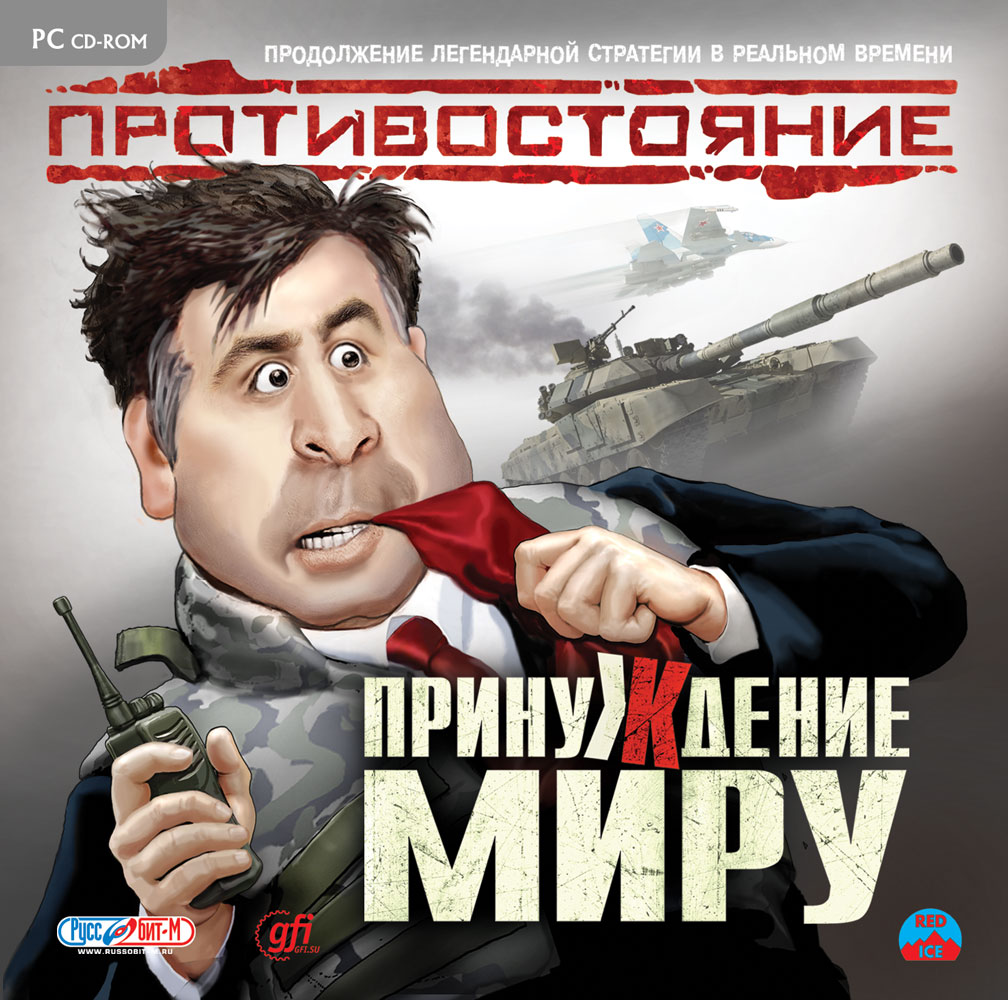
“The trouble is that “Peace Enforcement” is the same “Confrontation” as it was ten years ago, with no changes at all. And this means: muddy sprite graphics and tactics that are primitive by today's standards … Releasing something like this at the end of 2008 is akin to a war crime, ”Igromania wrote then.
The war in Syria inspired, according to Ovchinnikov, a number of Russian developers:
“Several different companies went around the market and looked for funding for projects, but almost no one found it. Although it was a fairly successful military operation, a lot of new technology was used.”
As a result, the only game about the Syrian war was the Syrian Warfare strategy. Its developers tried to raise money through crowdfunding, but failed, and when they finally released the project, they refused to disclose the sources of funding. Mikhail suspects that Yevgeny Prigozhin helped them, but there is no evidence for this.
State corporation and state grants
In December 2022, it became known that the government was discussing a whole federal project "The Game Industry of the Future". Deputy Prime Minister Maxim Parshin was tipped to be its leader, and Deputy Prime Minister Dmitry Chernyshenko was its curator. According to Kommersant, the maximum plan is to spend up to $50 billion to support Russian game studios. By 2030, this money can be used to release 25 games with a budget of 6.5 billion rubles or more, and another 40 simpler projects. A new structure called "Rosgeim" should become a strategic center for the development of games.
According to Ovchinnikov, all this is still in its infancy:
“Dmitry Chernyshenko made a speech that it would be nice to start spending money on the development of domestic games. Then a meeting was held at the Ministry of Digital Transformation, from where the information was leaked to Kommersant. As far as I know, formal instructions have been issued to collect proposals from representatives of the industry. There were several preliminary calls, market participants shared their ideas. After that, everything calmed down, a month has passed since then. So for now it's just an idea. No one has allocated state money yet.”
It is important not to confuse here: the distribution of grants through the IRI has nothing to do with Rosheim. This is an alternative project of state support for the industry. According to Mikhail, competing:
“Roughly speaking, they are moving forward with two different “Kremlin towers”. In one Ministry of Digital Development and Vasily Ovchinnikov with his "Organization for the Development of the Video Game Industry". In the other – IRI.
There is more progress. In 2022, at least two grant competitions were held: one in the spring, the other in the fall. In addition to "Counterintelligence", which at the stage of obtaining a grant was called "Secret Service: The Beginning", several more games received state support. Nothing is known about some other than the name. For example, the list on the IRI website includes the projects "SSR: Enemy from the Future" and "Vera and Foma: Let's Go Play!", which neither industry experts nor profile journalists have ever heard of.
For the second of the games, we managed to find a brief description. And not on the website of the grantor or grantee, but in the announcement about the search for a narrative designer for this project. From the message it followed that the game would be two-dimensional, in the genre of point-and-click adventure. "Players will experience the story of an amazing journey of two schoolchildren, brother and sister Vera and Foma, together with their friend Mikhail Gavrilovich and the wonderful dog Altai in different eras." In general, we are clearly talking about the ideological development of a series of comics by the Orthodox radio station "Vera" and the magazine "Foma".
Project producer Stanislav Lauk-Dubitsky told The Inisder that the plot will focus on the historical forks in the history of Russia through which the characters will pass. But it will be possible to talk about the details only after the conclusion of an agreement with Iran. And it hasn't been closed yet.
Troubles, PMCs and Denis Davydov
The most public project that received state support is called Troubles; it won a grant back in May 2022. According to Ovchinnikov, "this printed out the idea of allocating funds for the games."
No one officially named the amount, but Kommersant's sources spoke of 260 million state rubles. The plot of the game will be based on Mikhail Zagoskin's historical novel Yuri Miloslavsky, or the Russians in 1612, a bestseller of the early 19th century. Even historical coverage has been sacrificed to the literary basis – from the entire Time of Troubles, the game will have to be limited only to 1612. But the book is very patriotic, as is the project team.
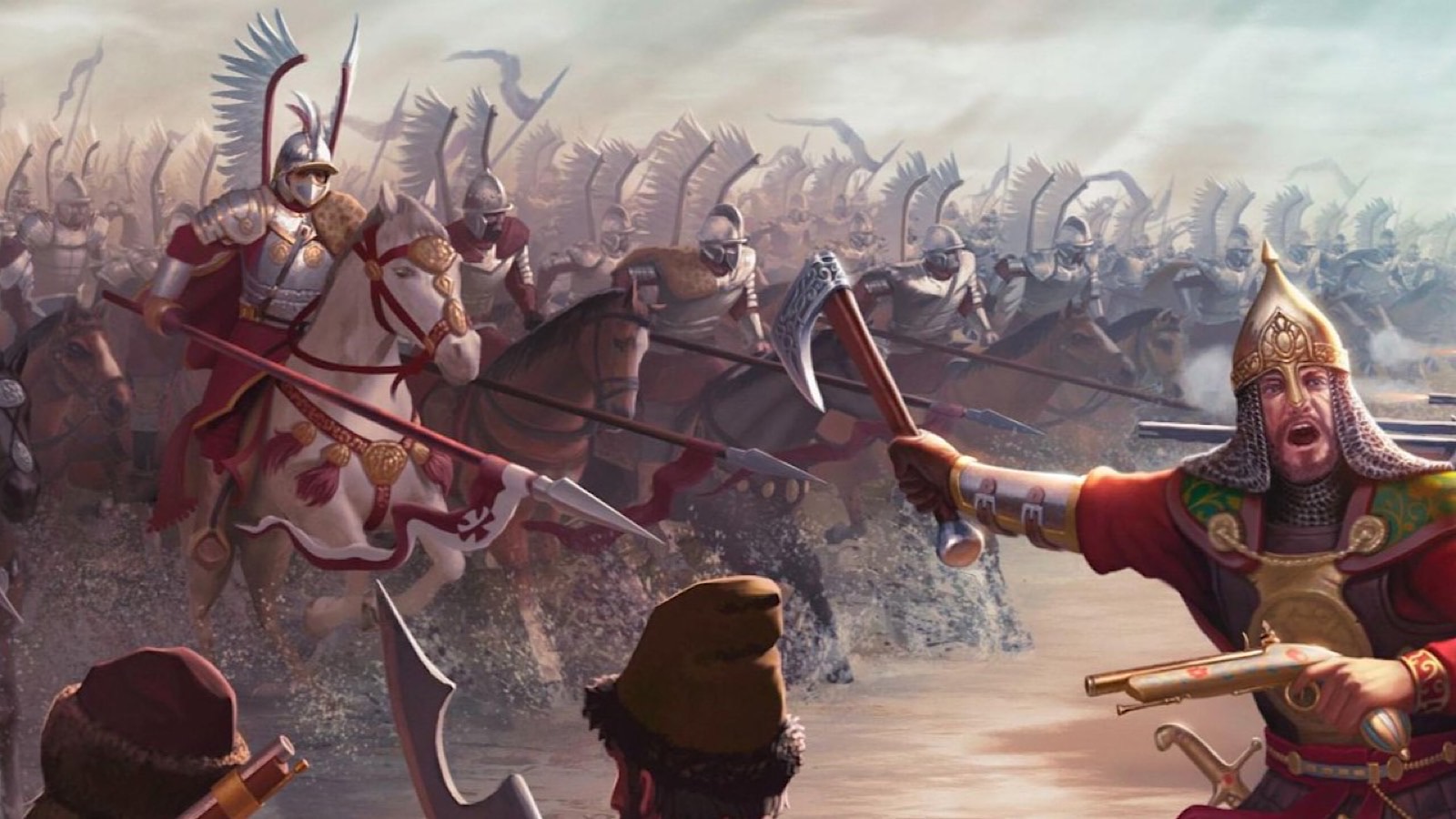
Recently, Alexei Koptsev, head of the grant-winning Novosibirsk studio Cyberia Nova, gave a long interview to the Game World Navigator, where he talked a lot about patriotism and opposition to the West. For example, when asked about the choice of plot, he answered this way:
“There were several reasons. On the one hand, the current geopolitical situation, somewhat reminiscent of the events of the 17th century. Geopolitics in general does not change, the location of resources does not change, the confrontation between East and West also does not change <…> The Time of Troubles is an extremely eventful, interesting and very important historical period in the history of not only Russia, but Europe in general. There was a high probability of losing our national identity. The prospect of becoming Catholic, the loss of the reigning dynasty … We had every chance of becoming somehow not quite Russian. That is why it is very important to study this period. For example, I really want the children, when journalists pester them on the street with historical questions, to be able to confidently answer what event the November 4 holiday is dedicated to.
And the interview ends with the words that we all need to unite today, following the example of the militiamen Minin and Pozharsky.
In the game, you will need to storm Moscow and attend the wedding of the kingdom of Mikhail Romanov. Talk, shoot, fight bosses, dress up as a prince, a robber or even a buffoon – the latter will make it possible to throw throwing bombs at enemies.
Koptsev assures that 45 people in the state and a large number of outsourcers are working on the project. Of these, five scientific consultants at once, among which there are people with academic degrees, and there are historical reenactors. Cyberia Nova has never made big games before. Basically, the studio was engaged in graphic outsourcing for large developers.
After the autumn grant competition, details about several more games appeared. One of them with a budget of 50 million rubles will be about the partisan of the war of 1812, Denis Davydov. Neither the developer, nor the genre, nor the amount of budget support, alas, is unknown. Adventure game about an alternative history of pre-revolutionary Russia "Trains" won a grant of 100 million rubles. Finally, the most expensive winner of the autumn competition is called Sparta. Its budget is 200 million rubles, and the amount of the grant is again not disclosed. The plot is about a Russian PMC (but not Wagner) fighting in Africa. The IRI assured journalists that "there will be no paraphernalia and no reference to reality, this is a game about brave guys from Russia who are fighting evil in this case in an African country."
The project will be taken over by a certain Lipsar Studio, which previously made only mobile games with the simplest possible gameplay. Its name says nothing to any of the experts we interviewed. But if you read it from the end, you get a "cut".
The project website is not yet operational. There is an empty VKontakte group with 12 members and a @lipsarstudio Telegram channel with 400 subscribers. There is only one post in the channel so far: “We are making a turn-based tactical RPG, like XCOM: Enemy Unknown or Jagged Alliance 2.” By the way, both games are timeless classics. The first came out in 1993, the second in 1999. Alexander Gorbachenko believes that with such an application, special attention will have to be paid to the plot and design:
“Is it difficult to make XCOM in 2023? Of course not. So a lot will rest on the scenario component, levels, gameplay, level design. Но посмотрим на это с другой стороны. ЧВК Вагнера — это те люди, действиями которых мы сейчас можем гордиться. И Африка является для нас стратегической территорией. И вот объявлен конкурс на российский игровой контент. Туда приходят люди и говорят: сделаем игру про частную военную компанию. Там посмотрели: хорошая тема. А может быть, кто-то из ЧВК Вагнера позвонил, письмо поддержки принес. Так ведь тоже может быть».
Косвенно эту версию подтверждает и комментарий разработчиков «Коммерсанту»: «Несколько наших сценаристов, которые работают над игрой, участвовали в военных действиях в Сирии».
Как их выбирают
«Поезда» от студии Watt с самого начала выбивались из числа остальных победителей конкурса, потому что эта игра не совсем про историю. Тут альтернативное прошлое, где опыты Николая Теслы оказались удачными, электричество можно получать прямо из воздуха, но все это привело к природным катастрофам. Прежде всего — к электрическим бурям, через которые можно проехать только на поезде. И вот по альтернативно-исторической Российской империи накануне революции путешествует на поездах студентка, дочь изобретателя, и пытается раскрыть секрет придуманного отцом вечного двигателя.
По словам руководителя студии Watt Егора Томского, это как раз тот случай, когда хороший проект после начала войны потерял финансирование:
«Мы придумали „Поезда“ в конце 2021 года и успели презентовать их разным издателям. Некоторые заинтересовались, например, польская 11 bit studios, но после 24 февраля все потенциальные инвесторы отвалились. О грантах ИРИ мы узнали летом на игровой конференции White nights. По условиям конкурса были определенные требования к сюжету: либо про войну и историю, либо про популяризацию научно-технических знаний. Мы соответствовали второму критерию. С нами даже хотел сотрудничать Политехнический музей, ведь игра — это возможность рассказать детям об электричестве».
Неделю команда студии готовила документ и бизнес-план. Потом проекты изучали эксперты. По словам Овчинникова, многие другие заявители даже до экспертов не дошли:
«Мне кажется, в ИРИ просто не смогли их все переработать. Половина проектов так и осталась на стадии регистрации документов».
С другой стороны, Михаил рассказывает, что в конце лета представители грантового конкурса все еще активно зазывали желающих:
«На меня вышел один старый знакомый с большим опытом работы в госстуктурах и сказал, что ищет проекты для ИРИ и что они готовы давать до 100 млн рублей. То есть у них либо просто не хватало заявок, либо они были настолько дерьмовыми, что пришлось привлечь рекрутера».
Финальным этапом отбора стал питчинг в Москве. В зале, по словам Томского, сидели человек двадцать, все из индустрии, никаких людей в погонах или в рясах:
«Я рассказал об игре, показал презентацию. И меня отпустили без единого вопроса. А вот дальше начались проблемы. Мы-то хотели работать, как обычно взаимодействуя с издателями: каждые два–три месяца сдавать какой-нибудь этап работ и получать часть суммы. Идея была в том, чтобы на деньги гранта сделать демоверсию и с ней уже искать софинансирование. А в ИРИ сказали, что оплатят только всю сумму за один раз, но лишь после того, как будут выполнены все условия — в частности, игру скачают 100 тысяч человек».
Стоимость игры, по оценкам создателей, составляет 160 млн рублей. Соответственно, 60 млн надо было привлечь со стороны. Но одно дело искать их, когда можно показать инвесторам почти готовый продукт. И совсем другое — делать это на этапе концепции. Студия, по словам Томского, пыталась взять кредит:
«Но ни один российский банк нам его не дал. Контакт с ИРИ был очень слабый. Я пытался договориться о встрече, обсудить условия, но мне отказали. Их представитель только пересылал ответы своего начальства. Единственное, о чем удалось договориться, что первые 30 млн нам дадут через семь месяцев, когда мы сделаем внутреннюю демоверсию. Это не решало проблему. В результате мы так и не смогли заключить с ИРИ договор. Мы этого не скрываем, так как надеемся на публичность».
Проект в изначальном виде пришлось закрыть. Вместо него к концу года выпустят графическую новеллу. Такую игру сделать проще и гораздо дешевле.
Продюсер игры про Фому и Веру Станислав Лаук-Дубицкий, считает, что Watt сами во всем виноваты:
«Они изначально допустили косяк и выбрали неверную стратегию, могли с самого начала указать, что хотят получить деньги авансом. Там была такая опция. Если хочешь работать по этапам, надо ставить галочку именно на авансы».
Михаил уверен, что эта история — хороший пример того, что люди из игровой индустрии не совсем понимают, как работает система грантов.
Магия гранта
У проекта «Магия знаний: история России» явно не было проблем с пониманием принципов госзаказа. Ведь его создатели — VK, Минпросвещения России и Российское общество «Знание». Все эти три организации обычно сами раздают гранты. А в данном случае выступили грантополучателями.
Сколько именно денег от ИРИ они получили, неизвестно. Но результат можно увидеть по адресу магиязнаний.рф. Игра заработала 21 декабря, так что это самый свежий на сегодня игровой проект, профинансированный государством.
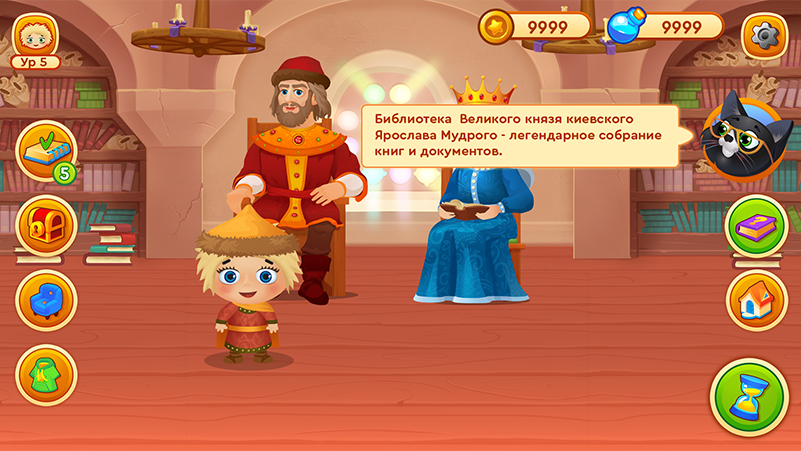
Сюжет замысловат. Волшебную школу захватила нечистая сила: Баба Яга, Кощей, Кикимора и почему-то Барабашка. Изгнанный с рабочего места Кот Ученый обращается за помощью к ребенку, за которого вам и предстоит играть.
Можно выбрать одежду, цвет волос и глаз, но герой все равно будет похож на домовенка Кузю в той сцене мультфильма, где его отмыли. Чтобы победить нечисть, надо взять меч-кладенец, который работает только на магической силе знаний. И знания эти весьма необычные. За первые полчаса игры вы узнаете, что князь Рюрик носил шлем с рогами, ладьи выдалбливали из цельного ствола дерева, а древнерусские дети играли в дымковскую игрушку и лечились подорожником.
«Обед готов! Давайте-ка поедим, приберем игрушки и пойдем отца в поход провожать», — обращается к герою и Коту Ученому древняя славянка. На этом игра виснет.
Игра виснет, но господдержка продолжается. Уже в этом году «Магия знаний» обещает добавить разделы про царей, СССР и современную Россию.


